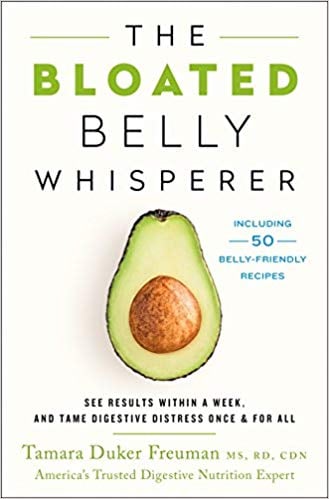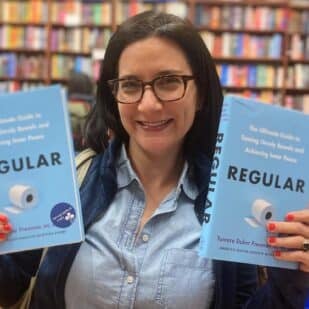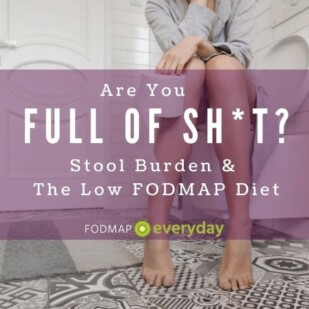Exclusive Interview with Dietitian Tamara Duker Freuman
Tamara Duker Freuman MS RD CDN came to our attention through our research into dietitians who were working with the low FODMAP diet in their practice, but we hadn’t had the opportunity to meet.
And then, in one of those small world experiences, Kristine Kidd, my editor from my days at Bon Appetit magazine, told me that she was developing recipes for a book with Tamara and that the low FODMAP diet was part of the focus. Small world!
Kristine made the introduction and Tamara, Robin and I hit it off.
We got to meet in person at FNCE 2017 (the Food & Nutrition Conference and Expo put on by the Academy of Nutrition and Dietetics) and immediately began strategizing about how we could collaborate.
On her site, tamaraduker.com, she says right up front that she is, “as both a clinician and writer…disarmingly frank”. You can find her writing in U.S. News & World Report, NPR, CNN and the Washington Post, in front of the camera on platforms as varied as Inside Edition and Business Insider and on various podcasts.
Let’s see if we can get Tamara to give us some of her straight talk. She also has twins, like me, so I know she is one tough, resilient cookie and has to have a sense of humor!
READ TAMARA’S ARTICLES HERE
Do you suffer from bloating? Tired of trying to figure it out on your own?
Check out Tamara Duker Freuman MS, RD, CDN’s brand new book The Bloated Belly Whisperer:See Results Within a Week and Tame Digestive Distress Once and for All
Tamara (pronounced ta-marra), I think I finally have the pronunciation of your name down. As someone whose name is Dédé (pronounced “day-day”) and who gets called “dee-dee” all the time, I wanted to make sure to get it right!
Dédé: Thank you for chatting with us. We love your combination of science-based nutritional advice with street savvy, give-it-to-you-straight language. Let’s give everyone a basic introduction. Tell us about your private NYC practice and your approach to educating patients with IBS.
I’m a dietitian embedded in a gastroenterology practice, so the vast majority of patients I see have digestive problems—and “bloating” is the most common complaint I see. My patients have a wide range of medical diagnoses—from IBS and SIBO to GERD and functional dyspepsia…and many, many things in between.
For patients with IBS, I have patients walk me through a typical day, so I can get a feel for what symptoms they experience at what times of the day and how they relate timing-wise to various meals and snacks.
I pepper them with questions about best-tolerated foods, worst tolerated foods; when in their lives they’ve felt best and when they’ve felt worst; and what their symptoms typically respond to. This process generally helps me hone in on the source of their problem, and dictates what dietary approach will likely yield the best results for them.
Then we give it a try for two weeks and regroup to see whether we’re barking up the right tree.
How did you first learn about the low FODMAP diet and did you embrace it right away for your clients?
I actually heard about the low FODMAP diet from a patient with severe IBS, whose adult daughter read about it online and encouraged her mom to talk it over with me. So I dove into the research literature and had a lightbulb moment: the diet provided a biologically plausible explanation for what I had been seeing as a clinician for years.
It explained why garlic and onion were such common symptom triggers for my IBS patients; why fructose and lactose testing/elimination was only giving our IBS patients partial symptom relief; why patients who didn’t have celiac disease still felt so much better on a gluten-free diet; and why energy bars and frozen yogurt make almost every patient with IBS feel awful.
Yes… I embraced it IMMEDIATELY.
Did you work with IBS clients and the low FODMAP diet during your time training at Mount Sinai Medical Center?
I did not. IBS is much more of an outpatient condition than an inpatient one; people generally aren’t hospitalized for it, so you rarely come across it in a hospital setting. In fact, I had barely even heard of IBS when I showed up on my first day to work at East River Gastroenterology & Nutrition and needed to lean heavily on a mentor of mine who worked in a GI practice to teach me the tricks of the trade.
But even then, the low FODMAP diet was not on her radar screen, so it wasn’t yet on mine, either.
It’s astounding to me how I practiced for those first few years without knowledge of the low FODMAP diet. It has become such an integral part of my toolkit—and of the standard of care for IBS patients—that in retrospect it feels like I was practicing blindfolded for those first few years out of the gate.
How do most of your clients find you?
Most of my patients are referred to me by other doctors in New York City. Mostly gastroenterologists, but also internists, endocrinologists, allergist/immunologists, obstetricians and cardiologists. Many of people also find me online, usually after reading one of the articles I’ve written online for US News that resonated with them.
A fair number of my patients live out of state, and some even out of the country—but thanks to technology, we’re able to work together virtually.
And what state of mind are they usually in? I know for me it took hitting bottom to dive into the diet.
Yes—rock bottom is an apt description of where many of my patients are when they arrive at my doorstep. Often, they’ve been to two or three gastroenterologists, have undergone multiple tests, spent a fortune on alternative medicine consultations/tests/supplements and mad themselves nuts with trying to self-diagnose online.
By the time they arrive to my care, they’re feeling hopeless—as if they’ve tried everything (they haven’t), been tested for everything (they haven’t) and must have something incredibly rare and untreatable (they don’t.) The best part of my day is when a new patient leaves my office telling me: “I feel so optimistic.” Equally gratifying is when I see them two weeks and they say: “I feel SO much better…. Where were you X years ago when I was suffering so much, and why didn’t anyone tell me about this before??”
As you know so well, the impact that the right diet change can have on quality of life for someone with IBS is nothing short of revolutionary—it cannot be overstated.
What do you find is the most challenging part of the diet for your clients, and what do you do to help them over that hump?
Eating out is probably the hardest for my patients following the low FODMAP diet, and that’s due to the ubiquity of onions and garlic. I try to remind them that the low FODMAP diet does not need to be followed religiously and dogmatically, and that the impact of FODMAPs is dose dependent.
A small amount of intake in the context of an otherwise low FODMAP meal eaten on an otherwise low FODMAP diet is generally not going to send someone into a massive downward spiral.
We also come up with strategies to offset the impact of accidental FODMAP intake when eating out—whether it be taking a Gas X or Beanzyme pill before the meal to prophylactically address meal-induced gas, to using an antispasmodic medication in advance.
But even just knowing what the cause of an IBS attack is—accidental FODMAP intake—can make it easier for my patients to handle without catastrophizing. They know what caused it, and they know it will soon pass… it’s just much less scary and feels less out-of-control once they understand the role of FODMAPs on IBS symptoms.
I love your calm, pro-active approach. It too shall pass, as they say. We know you have a moniker for yourself. Tell us what that is and how you came up with it.
I’m the Bloated Belly Whisperer! A patient once called me that, and I rather liked the ring of it. I think it really speaks to the heart of my clinical practice: I listen to patients describe the nature of their bloating, and help them and their doctors hone in on what is most likely causing it.
While we often thing of “bloating” as a phenomenon of IBS, there are about a dozen, very common medical diagnoses that produce bloating as a symptom. And depending on the cause of someone’s bloating, there will be differences in the dietary and medical approach to treating it.
I’ve “listened” to so many bloated bellies (and their owners) over the years that I can now spot the differences between them, often within minutes of meeting a new patient. Hence the name!
I laughed the first time you told me that and I giggle a bit every time I hear it. I think both because I was the queen of bloat (pre-FODMAP), so it resonates, and also because I think people still get uncomfortable talking about certain bodily functions. How do you help patients who can’t even utter the word “poop” or describe their bowel movements, let alone admit that they fart?
I set the tone early on in a session with a new patient by using these words as I question them. I ask them how often they “poop”; I ask them if they have gas—and if so, whether its “belchy gas or farty gas”; I ask them what the poop looks like and offer examples–hard little balls? Soft pieces of shredded wheat? Long smooth logs?
For the record, I was always belchy and my husband called my poops “truffles” because they look like little chocolate truffles. 🙂 TMI perhaps.
Once patients hear me use these words and see the ease and comfort level with which I discuss these issues, they always relax and follow my lead. They understand they’re in a place where we’ve seen it all and heard it all—and that nothing they tell me will be gross, surprising, abnormal or unheard of. From these candid conversations, I’ve gotten some of my best descriptors of poop from patients over the years!
Do you have a typical IBS client? Do you find that more are dealing with diarrhea, constipation or what is the most common presentation of symptoms? The reason I ask is that I never had any issues with my bowel movements – yet the IBS symptoms of bloat and pain were absolutely debilitating – and I found that many doctors and laypeople would immediately go to the bowel movement questions and when I would answer that I was “normal”, it was like I wasn’t “in the club”.
Probably the only thing typical about IBS patients in my experience is the ‘visceral hypersensitivity’—or, being exceptionally tuned in to stimuli and sensations in the digestive tract. Someone without IBS might skip a day of pooping and it wouldn’t even register… whereas someone with IBS who skips a day will be so bloated and uncomfortable feeling the need to go that it preoccupies them all day long.
But other than that—there are no ‘rules.’ I have plenty of patients who are diarrhea predominant, plenty who are constipated, and plenty who ricochet between these two poles. And there are plenty of other bloated IBS sufferers (like you once were!) who are regular in the bathroom, but extremely sensitive to foods.
I find it easiest to just avoid labels that might pigeonhole someone and just listen to their symptoms: tell me your symptoms, and I’ll tell you how to eat. I don’t need to know what your medical diagnosis is or isn’t.
You are working on your first book, to be published February 2019. Tell us about how that came about and how you got connected with my old friend Kristine! She is an amazing recipe developer and editor; I cannot wait to see this collaboration. I know some of this might still be hush-hush, but tell us what you can. We are all about amazing recipes here at FODMAP Everyday® and I know Kristine and you will knock this out of the park.
My book is going to be the authoritative guide to bloating, helping chronically bloated people figure out what is causing their symptoms once and for all—and how to fix them. It will address the top 10 causes of belly bloating—what causes them, what they feel like, how a doctor might diagnose and treat them, how I would use diet (and if appropriate, supplements) to manage them.
It’s designed to empower people to take their symptoms into their own hand, and speed up their medical diagnostic process by equipping them with the right questions and information to share with their doctor.
I was introduced to Kristine through my agent, who also represented Kristine on her many cookbooks. We were a match made in heaven: we both have celiac disease, we both follow a similar Mediterranean-type diet, and she is allergic to garlic! That made her a natural fit for developing a variety of healthful, flavorful recipes suitable for people on restricted diets.
I can’t wait for you guys to try some of her low FODMAP recipes—they’re amazing and so cleverly engineered to deliver flavor and ingredient variety within the confines of the allowable ingredients and portions.
By the way, when I speak your name to Siri on my iPhone, she spells out “tomorrow” LOL. I guess if one says “tomorrow” with a New York accent it’s kind of like your name, ha! I am determined to train her to spell it correctly.
Or you could just program my name into your phone as Tomorrow! I can only imagine what she does with my last name…
LOL Touché. Thank you so much Tamara!
Do you suffer from bloating? Tired of trying to figure it out on your own?
Check out Tamara Duker Freuman MS, RD, CDN’s brand new book The Bloated Belly Whisperer:See Results Within a Week and Tame Digestive Distress Once and for All
America’s trusted digestive nutrition expert shares her personal program to vanquish bloating in a groundbreaking book that will help readers see results in a week or less!
With 50 recipes from former Bon Appétit editor and cookbook author Kristine Kidd
















How can The bloated belly whisperer be in line with Low FODMAP
Recipes when is has avacado on the cover?
Have you seen our many recipes including avocado? And our article, Is Avocado Low FODMAP? Check it out! Avocado is low FODMAP in 30 g portions and we even show you in pictures how much that is whether it is sliced or cubed or mashed! Tamara knows her stuff!
This book is not only about low fodmap eating, it covers quite a few different conditions that can lead to bloating. It’s an excellent resource so don’t be influenced by the food on the cover.
YES! It is a fantastic book. And Tamara is an incredibly smart and funny writer – it is also a great read!
Last year I went through the elimination diet and reintroduction with Joe Leech. I am 74 years old and had food and abdominal issues going as far back as I can remember including as a child. No previous conclusive diagnosis other than IBS about two years ago with very little help on diet in spite of my requests. I was amazed how wrong I was about my triggers as evidenced by the “diet”. I accidently stumbled onto The Bloated Belly Whisperer recently and reading it was more eye opening than I would have imagined and it really took my education and understanding to another whole level. I have also learned a lot from Fodmap everyday. I have had the most wonderful calm from indigestion, gas, constipation, bloating for the last five or six months and am now well educated (from these resources) on how to eat defensively and know exactly what caused my discomfort or symptoms. Thank you to those of you who have helped me through this long uncomfortable journey and I look forward to more from you in the future.
Charlie, what a lovely note. We are so happy to hear that you are figuring out your needs – and that we have been able to be part of the solution. We just published another golden article by Tamara on FARTING! We think you might find it interesting. And of course, I would be remiss if I didn’t point out her article on Timing of Digestive Symptoms.